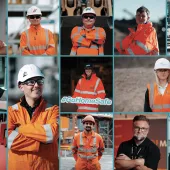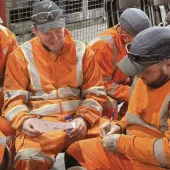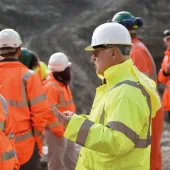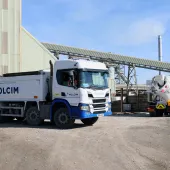A Mindful Approach to Employee Health & Safety

First published in the June 2017 issue of Quarry Management
Although the construction sector continues to improve the protections offered against physical injury, safeguards for employee mental well-being are not currently as well resourced – and it is a growing issue which the industry must tackle together. Joanne Hankinson, HR business partner at Aggregate Industries, explains why mental well-being is integral to any health and safety programme and what the business is doing to help.
The construction industry has long been something of a health and safety loophole in that protocol has often focused purely on physical injury and illness, with mental well-being falling firmly by the wayside. Core to this has been the associated stigma around mental health, whereby working in an inherently male-orientated ‘macho’ industry, it has been too difficult for construction workers to open up and talk freely about any issues they may be feeling.
However, this notion of ‘keeping shtum and plodding on’ has had catastrophic effects. A recent report1 shows that at any given time, across England and Wales, one in six workers is said to be experiencing depression, anxiety or other stress-related problems. The same study suggests that, given that the UK construction population is around 2.1 million people, up to around 350,000 construction professionals may be affected by mental health issues.
Worse still, new research2 by Public Health England (PHE) has revealed that male construction workers are at the greatest risk of suicide, at 3.7 times above the national average. Tellingly, the PHE asserts that, in
It may come as no surprise then that the mental health issue has quickly risen up the ranks as one of the most pressing currently facing the construction sector – and one which must be tackled head on. In January 2016, the Health in Construction Leadership Group (HCLG) outlined a need for a new approach to health in the industry. Then, in January this year, there was the launch of ‘Mates in Mind’, a charitable programme set up by the HCLG, with the support of the British Safety Council, in a bid to raise awareness and understanding of poor mental health in the construction sector.
However, there is still much work to be done at ground level. Although many companies within the quarrying and construction industry already have effective health and safety strategies, the emphasis is often centred on physical safety elements, such as noise, working at height, lifting heavy loads and working with machinery. It is important that the mental health of the workforce is also considered and cared for.
Putting mental health at the forefront
To help businesses, the Health and Safety Executive (HSE) has developed its ‘Management Standards for Work Related Stress’. The management standards are five steps to help an organization become better equipped and more effective at managing and controlling the risks of work-related stress. The standards offer an approach to risk management that can be reviewed in line with an organization’s current policies and procedures, and advises on how to make them part of everyday management. An integral part of this is developing the managers within an organization.
Aggregate Industries have successfully introduced a company-wide Mental Health First Aid initiative in partnership with Mental Health First Aid England. As part of the scheme, almost 300 employees have undertaken an introductory mental health awareness course. The 3h intensive programme looks at how mental health is defined and considers how individuals can look after their own mental health and well-being. It also aims to equip employees with the knowledge to support other colleagues and to better empathize with other people’s experiences.
Recognizing the impact that stress-related illnesses have on their own business, Aggregate Industries wanted to implement a programme that would help individuals spot the early signs of mental health problems to avoid, wherever possible, ill health and to guide them towards the right support.
Furthermore, Aggregate Industries wanted their line managers to have a real understanding of mental health issues. So, in addition to offering Mental Health First Aid England courses, the company has also developed a resilience e-learning programme, which includes details of the HSE management standard while also encouraging managers to think about people’s roles and how they are supported, helping them to spot the early signs of stress-related conditions within their own teams.
The response to opening up the dialogue around mental well-being and stress within Aggregate Industries has been phenomenal. Forty-five employees have gone on to train as a mental health first-aider. These individuals can now provide help on a first-aid basis and offer guidance to their colleagues about where to go for support. Just like the company’s traditional safety first-aiders, posters are placed at sites so colleagues know who their site mental health first-aiders are and how to reach them for support. This is proving invaluable and is encouraging employees to be more open about a subject that is very often just brushed under the carpet.
We all have busy lives and so to further support their employees Aggregate Industries have launched Health Assured, an employee assistance programme aimed at providing support to help balance work and home life. The telephone service is free to all employees and available 24 hours a day, seven days a week, giving confidential support in all areas of life, from family issues to lifestyle addictions or financial worries.
A holistic approach to health
Looking wider at health as a whole, in 2013 Aggregate Industries launched the Healthy You campaign, to refocus the business on health, as well as safety, and the effects good health can have on the safety of the workforce. With poor physical health being closely linked to poor mental well-being, the aim of the initiative is to help employees be as healthy as possible through a course of both medical and more consultative tactics.
As part of this, while previously only conducted pre-employment, Aggregate Industries have introduced mandatory biannual health screenings for all higher-risk staff, including site and night-shift workers, and screenings every three years for all other staff. On two occasions this has proven life saving for employees in detecting conditions that, if left undiagnosed, could have proved fatal. Subsequently, both employees have radically changed their lifestyles and shared their experiences with colleagues to highlight the value of the screening.
In addition, the company’s Healthy You campaign aims to tackle the problem of obesity with a weight-loss programme and various activity-based options, in addition to support for smoking cessation. While the physical benefit of these focuses are clear to see, they have also had a significant underlying effect in creating a happier, more health-conscious workforce.
Evolving with the times
Although construction is associated with more physical job roles, the reality is that it can also be extremely mentally demanding, with workers under pressure to keep to tight deadlines, within budget and produce an increasingly complex specification. As such, it is vital that businesses finally begin to evolve their health and safety protocol to give as much consideration to the mental well-being of their staff as they do to their physical welfare. In a sector with an aging workforce where people need to be fitter for longer, this is vital to ensure a safe and sound sector for years to come.
References
- www.thenbs.com
- www.theguardian.com/society/2017/mar/17/male-construction-workers-greatest-risk-suicide-england-study-finds
- Subscribe to Quarry Management, the monthly journal for the mineral products industry, to read articles before they appear on Agg-Net.com








